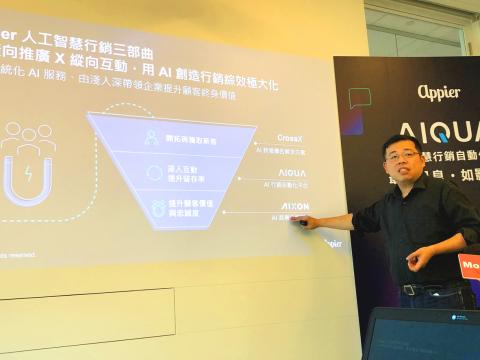Artificial intelligence (AI) developer Appier Inc (沛星互動科技) yesterday launched AIQUA, a proactive marketing automation platform that it says helps businesses send more accurate personalized messages.
AIQUA harnesses the power of AI to pre-emtively understand and segment an audience and engages users with AI-based messages across Web sites, text and messaging apps, app notifications and e-mail, the Taipei-based company said.
To do so, AIQUA provides proven AI models that help businesses understand the behavior and interests of audiences outside its own channels, combining digital footprints on external channels with their own customer data, Appier said.

Photo: Chen Ping-hung, Taipei Times
Currently, a customer who uses different devices on different shopping Web sites is identified as different users by each site, leading to missed sales opportunities, the company said.
Unbeknown to retailers, a consumer could be a frequent shopper of baby products at one online store and also purchase cosmetics products regularly at another, it said.
With AIQUA, the two user footprints would be identified as from the same person, allowing businesses to place well-timed and personalized promotional messages to maximize spending, Appier said, adding that its app can track a digital presence across devices, Web sites and apps using cookies.
The new platform also provides an integrated dashboard to offer marketers an easy way to manage multiple channels and avoid inefficiencies caused by fragmentation, Appier said, adding that it only works with partners who are compliant with the privacy rules of their markets.
“Our many clients across Asia have made it clear to us that there is immense room for improvement when it comes to engagement and personalization,” Appier chief executive officer and founder Yu Chih-han (游直翰) said.
AIQUA is the latest step toward fulfilling Appier’s mission to make AI easier for enterprises and was built after the company acquired QGraph, a Bengaluru, India-based mobile marketing automation start-up earlier this year.

The Eurovision Song Contest has seen a surge in punter interest at the bookmakers, becoming a major betting event, experts said ahead of last night’s giant glamfest in Basel. “Eurovision has quietly become one of the biggest betting events of the year,” said Tomi Huttunen, senior manager of the Online Computer Finland (OCS) betting and casino platform. Betting sites have long been used to gauge which way voters might be leaning ahead of the world’s biggest televised live music event. However, bookmakers highlight a huge increase in engagement in recent years — and this year in particular. “We’ve already passed 2023’s total activity and

Nvidia Corp CEO Jensen Huang (黃仁勳) today announced that his company has selected "Beitou Shilin" in Taipei for its new Taiwan office, called Nvidia Constellation, putting an end to months of speculation. Industry sources have said that the tech giant has been eyeing the Beitou Shilin Science Park as the site of its new overseas headquarters, and speculated that the new headquarters would be built on two plots of land designated as "T17" and "T18," which span 3.89 hectares in the park. "I think it's time for us to reveal one of the largest products we've ever built," Huang said near the

China yesterday announced anti-dumping duties as high as 74.9 percent on imports of polyoxymethylene (POM) copolymers, a type of engineering plastic, from Taiwan, the US, the EU and Japan. The Chinese Ministry of Commerce’s findings conclude a probe launched in May last year, shortly after the US sharply increased tariffs on Chinese electric vehicles, computer chips and other imports. POM copolymers can partially replace metals such as copper and zinc, and have various applications, including in auto parts, electronics and medical equipment, the Chinese ministry has said. In January, it said initial investigations had determined that dumping was taking place, and implemented preliminary

Intel Corp yesterday reinforced its determination to strengthen its partnerships with Taiwan’s ecosystem partners including original-electronic-manufacturing (OEM) companies such as Hon Hai Precision Industry Co (鴻海精密) and chipmaker United Microelectronics Corp (UMC, 聯電). “Tonight marks a new beginning. We renew our new partnership with Taiwan ecosystem,” Intel new chief executive officer Tan Lip-bu (陳立武) said at a dinner with representatives from the company’s local partners, celebrating the 40th anniversary of the US chip giant’s presence in Taiwan. Tan took the reins at Intel six weeks ago aiming to reform the chipmaker and revive its past glory. This is the first time Tan